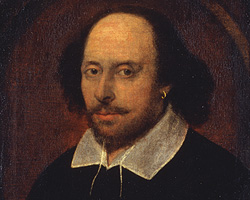Shakespeare's Source Material
by J. M. Pressley, SRC Editor

Shakespeare Fun Fact
Shakespeare has at least one lost play to his credit, Cardenio. It's not known whether or not he borrowed the idea for it.
In the entire canon of William Shakespeare's works, there are few original plots. Shakespeare was as gifted a borrower as he was a writer. Drawing from classical works, histories, and other literary sources, Shakespeare liberally adapted stories (sometimes lifting words and phrasing) in creating his plays. Gerald Langbaine was the first to note Shakespeare's use of sources in his 1691 work, Account of the English Dramatick Poets. Since then, we have developed a greater understanding of how much Shakespeare owed to other writers for his inspiration—and a greater appreciation for what differentiates him from the other playwrights of his day.
Classical Sources
Two of Shakespeare's greatest classical sources are Plutarch and Ovid. Plutarch's Parallel Lives provides the biographies of Greek and Roman rulers that Shakespeare used in creating Julius Caesar, Antony and Cleopatra, Coriolanus, and Timon of Athens. Ovid's Metamorphoses, which seems to have been Shakespeare's primary source for classical mythology, leaves its imprint on Titus Andronicus and Midsummer Night's Dream. Shakespeare's early comedies lean on Roman playwrights Plautus and Terence for situational plots and character archetypes. And Hamlet derives at least in part from the tale of Amleth from the Gesta Danorum (Deeds of the Danes) by Saxo Grammaticus.
Historical Sources
Raphael Holinshed's Chronicles of England, Scotland, and Ireland was perhaps Shakespeare's greatest single source. All of the history plays show at least some influence of Holinshed's work, as do Cymbeline, King Lear, and Macbeth. The chronology, characters, and events given in the Chronicles are generally condensed to fit the dramatic narrative, but Shakespeare practically quotes Holinshed in places. Shakespeare also uses Edward Halle's The Union of the Two Noble and Illustre Families of Lancaster and York and Samuel Daniel's The Civil Wars between the Two Houses of Lancaster and York as source material for his plays dealing with the Wars of the Roses. To a lesser extent, the history plays further show at least passing familiarity with the works of other English historians such as Richard Grafton, John Speed, and John Stow.
Literary Sources
Shakespeare wasn't above mining other authors for his plays. The Decameron of Giovanni Boccaccio provided material for All's Well That Ends Well, Cymbeline and The Two Gentlemen of Verona. Arthur Brooke's poem The Tragical History of Romeus and Juliet served as the source for Shakespeare's Romeo and Juliet. Chaucer provides source material for The Two Noble Kinsmen, Troilus and Cressida, and Midsummer Night's Dream. There are even plays based on the works of other playwrights. Hamlet owes a debt to Thomas Kyd's The Spanish Tragedy and an earlier play alluded to in other sources, commonly called the Ur-Hamlet. The Merchant of Venice can be seen as a reflection of Christopher Marlowe's The Jew of Malta, and King Lear is a direct descendant of the anonymous True Chronicle History of King Leir. There are plenty of examples of this throughout the canon; more than half of Shakespeare's plays show traces of an earlier work by another playwright or author.
Biblical Influences
Finally, while Shakespeare did not use religious tales as sources for his plays, his work contains many Biblical references and allusions. In fact, Shakespeare uses Biblical allusions more frequently than any other Elizabethan playwright. Shakespeare's three most likely sources were the Geneva Bible, the Bishop's Bible, and the Book of Common Prayer. The works prior to 1598 show more influence from the Bishop's Bible; the works thereafter align more closely with the Geneva Bible.
Conclusion
The closer we study Shakespeare's plays, the more apparent the influences on them become. It should hardly lessen our appreciation of his writing. Quite to the contrary, it gives us even more insight into Shakespeare as both an author and a fairly avid reader. Shakespeare's works show a playwright with not only a gift for popular entertainment but a genuine zeal to absorb whatever he could from a wide variety of sources.
Sources/Further Reading
The Bard of Avon, Encyclopædia Britannica's Guide to Shakespeare, Folger Shakespeare Library, Internet Shakespeare Editions, Mr. Shakespeare and the Internet, Shakespeare Online

